Introduction
1.1 Internet of Things
In general, there is no accepted definition about the Internet of Things. Actually, there are many different groups of people that have defined the term, although its initial use has been attributed to an expert on digital innovation named Kevin Ashton [1]. We get a common idea in all the definitions that the first version of the Internet was about data created by human, while the next version is about data created by things, that’s why it called the Internet of things.
There are many definitions for the Internet of Things. Below come some of the definitions:
IoT was generally defined as “dynamic global network infrastructure with self-configuring capabilities based on standards and interoperable communication protocols; physical and virtual ‘things’ in an IoT have identities and attributes and are capable of using intelligent interfaces and being integrated as an information network” [2].
The purpose of IoT is to increase the functions of the first version of the Internet and make it more useful. With IoT, users can share both information provided by humans that contained in databases and also information provided by things in physical world [3]. We can describe the IoT as the connection of physical things to the Internet and to each other for various useful purposes through different intelligent technologies, creating a smart ecosystem of pervasive computing. It can also be described as including embedded intelligence in individual objects that can notice changes in their physical state.
The common definition of IoT is that computers, sensors, and objects interact with each other and process data, therefore we can state that IoT is a new technology system combined with a a number of information technologies.
The Internet of Things combines different technologies into a semi-autonomous network. It connects individual devices to the network and to each other. There are also controller systems in the network (software and services) that act as brains of the system for processing data by analyzing and using the data collected by the connected devices to make decisions and initiate actions from the same or other devices [4].
The central objective of IoT is to enable us to uniquely identify, signify, access and control things at any time and anywhere by using internet [5]. The interconnected device networks can result in a large number of intelligent and autonomous applications and services bringing significant personal, professional, and economic benefits [6].
Smart environments are aimed to exploit rich combinations of small computational nodes to identify and deliver personalized services to the user while they interact and exchange information with the environment [8]. IoTs technology can be applied to create smart homes in order to provide intelligence, comfort and to improve the quality of our lives.
1.2 Smart Home
A “smart home” can be defined as a home which is automated through the application of the Internet of Things technologies and capable of reacting to requirements of the inhabitants, providing them comfort, security, safety and entertainment [9].
In the future, the IoT will anticipate to have significant home and business applications, improving the quality of life and the world‘s economy. With IoT, it is possible to access and control the electrical devices installed in your house remotely anywhere and anytime in the world. For example, smart-homes will enable their inhabitants to automatically open their garage when reaching home, prepare their coffee, control air conditioning systems, smart TVs and other appliances inside the home. Smart devices and automation systems make up Smart Homes. Everything connected with the help of Internet. Simple home automation uses timers and clocks to enable desired operations, but smart home technology can handle more complex operations and trigger devices based on input from other devices [4].
Basically, smart homes are equipped with advanced automatic systems for various preprogrammed operations and tasks such as temperature control, lighting, multi-media, window and door operations, etc. The smart home environment is also referred to as ambient intelligence, which is sensitive and adaptive to modern human and social needs [10]. SH is a
very promising area, which has different benefits such as providing increased comfort, greater safety and security, a more rational use of energy and other resources thus contributing to a significant savings. This research application domain is very important and will increase over time as it also offers powerful means for helping and supporting special needs of the elderly and people with disabilities [11], for monitoring the environment [12] and for control.
According to [13], the primary objectives of a Smart Home are to increase home automation, simplify energy management, and reduce environmental releases. Energy consumption and occupants’ comfort are key factors when assessing smart home environments [14].
1.3 PROBLEM STATEMENT
Now days all have busy life for e.g. person staying somewhere for job and another someone come and if you having an important meeting can’t pick them and they don’t have keys of home. This will put you in trouble. So with help of this project sitting in office person can open home for our people. If you are working whole day in office and after your office work you don’t want to do household works then home will do its own works like task of filling water, charging devices in absence of home owner. If you come home and your freeze will tell you what you can make in eating without opening it from the contents of food which are present in is then how awesome. If our daily life will become easily and less complex it will be than the golden era of technology.
1.4 Aim and Objective
This thesis addresses an IoT software-based approach on the field of Home Automation. Common use-cases include measuring home conditions, controlling home appliances and controlling home access through RFID cards as an example and windows through servo locks. However, the main focus of this thesis is to control the home appliances. More specifically, we address appliances such as electric rice cooker, music system and other electric devices.
2 Literature Review
Internet of Things (IoT) term addresses a general thought for the limit of framework contraptions to differentiate and accumulate information from around the world and afterward supply that information over the web wherever it is taken care of and utilized for numerous charming functions. Numbers of People have featured the work done on IoT and its applications throughout the years. This segment centers on a writing audit in these zones.
Juan Felipe Corso arias from Granada University display the outline of a remote correspondence framework, where the sensor idea linked to the mechanical mechanism, which senses the temperature. We can access those sensors from many places as they are NOT based. The data is cached in the cloud repository. PLC is used that interact with sensors. The watching system becomes finished with a SCADA framework and the showing of the correspondence framework changed into carried out making use of the formalism of Petra nets, as a framework that reacts as far as discrete activities. [3]
Chirag M Shah et al [1] present an examination on the best way to change the current access control frameworks when gadgets are getting more brilliant day by day. This method of improving the doorway manage framework which guarantees that the schema is far-flung in this manner reducing wiring problem. These data resources are organized in the controller (TM4C123GXL-in light of ARM Cortex-M4). Using AI, computations are executed to display and look into amassed records.
Vishwajeet H Bhide, K.J college of Engg., Pune. In this paper, he discloses how to give completely savvy condition by observing by different sensors (Temperature, Humidity, Light, and Level) for giving fundamental information to naturally change the solace level in homes by enhancing utilization of vitality. We likewise utilize forecast here for consequently location and determination of any issue in the gadgets. For that, we are utilizing Naive Bayes Classifier calculation for information mining. It will send email or SMS to a required specialist for administration and it will likewise inform the proprietor. This gives an enormous preferred standpoint on the keen home frameworks utilizing IoT. [15]
Byung Mun Lee* and Jinsong Ouyang, Gachon University, Korea – clarifies that supervision of incessant sicknesses is imperative to own administration for well-being. The IoT idea assumes a noteworthy part of self-administration for well-being. With a specific end goal to achieve it, individual well-being gadgets require two capacities, for example, application organizes the convention and savvy benefit. Be that as it may, the vast majority of them have the just basic capacity, for example, showing estimated information and putting away information incidentally. In this exploration, we proposed a smart administration display for social insurance which gives a compelling criticism to a person. So as to do this, we presented the cooperation convention which exchanges hazard factors between IoT individual well-being gadgets. At long last, in light of the discoveries of the analysis, the adequacy was affirmed on proposed demonstrate. [5]
Chang-Su Ryu et al [4] proposes an Internet of Things (IoT)- based savvy fire crisis reaction framework that can control directional direction brilliantly as per the time and area of a calamity and the outline of a coordinated control framework utilizing remote sensor systems to address the issues with existing fire crisis reaction frameworks in the midst of flame or building breakdown.
P.Elanthiraiyan, Dr. S.Babu, IEFT College of engineering.This paper clarifies how IoT is excelling in the medical sector. One of the better ways the specialists are fit to surely and rapidly ideal to utilize the significant patient data’s and including the patient restorative history. Through IoT, enormously enhances the quality of data and how a patient’s taken care of in the Medical field. Thus, Internet of Things offers a real stage to interconnect the every one of the assets Ontology helps PCs in furthermore understanding the side effects and therapeutic assets. Along these lines, Ontology makes a recovery system and reconfigures therapeutic assets as indicated by patient’s particular prerequisites quickly and over and over. [2]
Kostas E Psannis et al [16] proposed dedication of Cloud to the evolution of IoT. Hence, it demonstrates how Cloud technology modernization complements the ability of the IoT and overviews the safety problems of cloudIoT.
Manual De Buenaga et al [11] portrays the preparatory approach of “Virtual Cloud Carer”, Whose simple function is the formation of recent health administrations forwards, utilizing improvements based on smart devices.
Rodger Lea et al [12] present the general ideas of IoT center points and after that talk about our work, to sum up, our IoT center point as a Smart City PaaS. We quickly portray our approach and talk about our encounters sending cloud-based city centers, located in Canada and United Kingdom
Subhadeep Sarkar et al [13] clarifies near examination of the mist figuring worldview and the ordinary distributed computing worldview with regards to smart devices, by scientifically defining the parameters and qualities of mist registering—one of the primary endeavors of its kind. With the quick increment in the quantity of Internet-associated gadgets, the expanded interest for constant, low-inactivity administrations is turned out to be trying for the customary distributed computing system.
Aboli Mane et al [19] this paper explains the advanced era for home administration framework and security to make human life all the more simple and extravagances. This paper manages issue looked by people groups in everyday life, principle Moto of this paper is to make things less intricate and accessible in low costs.
Vandana C. P et al [20] in this paper, we have proposed the Security issues in the home automation which incorporate the Authorization and the entrance control. The Existing frameworks utilized as a part of the home Automation have been quickly clarified in this paper. Verification Manager and Access Control Manager are utilized to give security to these API empowered gadgets. Confirmation chief creates an entrance control token to check the client and the Access control director is to deal with the privilege of clients and confine access to assets.
Hiral s. Doshi et al [21] In this paper, we will execute a basic yet viable way to deal with assemble the IoT stage for remote observing and detecting of information, home computerization, industrial automation and many more.
Surinder kaur et al [22] it is presumed that all the home robotization framework methods utilize remote technology. Arduino, GSM and Android based home robotization strategies have been executed with a specific end goal to give simplicity to the general population to control their home machines. Diverse home mechanization methods utilizing Arduino, GSM and Android are given with their outline, execution and flowcharts which gives the fruitful format of their qualities and shortcomings.
Jyotsna P. Gabhane et al [23] in this paper Web of Things has numerous applications in various territories. It has been created for Smart Homes System. This paper shows the engineering of IoT and design of Smart Homes utilizing IoT. There are a few issues found in IoT and Smart Homes. New advancements could limit some of them. This paper exhibits the issues and difficulties that could come. New advancements and approachs which are as of now used to enhance uses of IoT have been talked about in this paper. CPLD controllers, zigbee modules, RF modules are currently in used for IoT.
Kaushik Ghosh et al [24] in this paper, a novel design for minimal effort and adaptable home control and observing framework utilizing Android based Smart telephone is proposed. Any android based portable can be utilized to control distinctive gadgets utilizing web server. Such venture can be extremely valuable for old and physically crippled individuals. The venture has tremendous extension for advancement. A wide range of highlights can be included later. Voice controlling empowers clients a feeling of solace as no immediate activity with the home robotization framework is required. The proposed framework decreases the wiring by utilizing remote systems.
3 BACKGROUND
3.1 Overview of IoT (Internet of Things)
Internet of things is a pushed arranges that interfaces each physical device around us and engages machine-to-machine correspondence. It relies upon circulated registering and data gathering sensors. The data accumulated from related contraptions are brisk, versatile and virtual. Additionally, it will change every single piece of our lives from the way we complete things to the way we pass on. Essentially, all that we do will be “insightful.”
In any case, at whatever point a talk related to the Internet of Things is raised, the primary thing that hits our head is the M2M correspondence. In any case, a machine doesn’t have the normal knowledge to work without any other person and the word ‘splendid’ isn’t by and large related to M2M. The chips and sensors introduced inside these machines make them splendid.
Sensors are chip-like devices that enable machines to measure, evaluate, and collect data. The web of things amalgams three fundamental portions: sensors, contraptions, and cloud compose. The authentic estimation of the Internet of Things must be seen when machines and sensors meet to collect profitable data and store them to a cloud mastermind, empowering associations and individuals to utilize the accumulated data. Remember the data assembled from sensors are vain until the point that we are set up to separate it logically.
Cloud-based applications empower associations to utilize the data. Such applications interpret and transmit the data gathered from sensors.
IOT is when general things and things are related with the web. These related things can be devices, structures, sensors, and contraptions. Along these lines, when you see the articulation “IoT-engaged” or “related”, it suggests it is related with the web, fit for passing on data and being controlled remotely or normally, and can streamline frames, as by saving money.
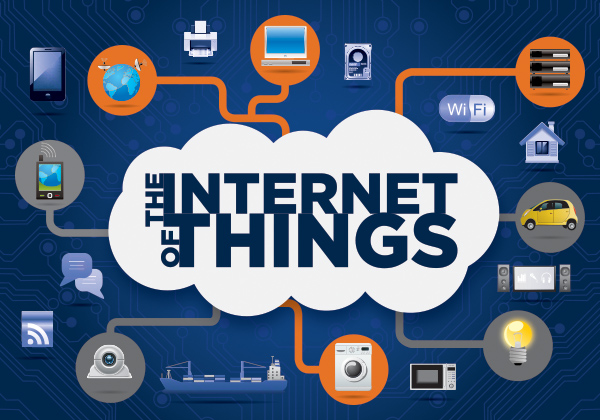
Fig: 1
Figure 1 explains how gadgets are associated with each other remotely with the assistance of internet.Internet of things is system of physical gadgets associated with each other for trade of information and data through sensors and actuators. These actuators and sensors are installed on to these gadgets which enable them to trade information with each other. In basic terms, IoT implies letting the gadgets to associate with the web to make our life substantially simpler. The ‘things’ here allude to web of things gadgets like chips, cameras, sensors or such other physical gadgets.
IoT will be a fundamental piece of our life in not so distant future. Through IoT, removed or remote articles can be controlled on this system. You may have caught wind of savvy homes. The idea of savvy homes depends on Internet of Things (IoT). In any case, IoT isn’t restricted to savvy homes as there are different uses of IoT which will be examined later in this article.
IoT covers an unmistakable number of conventions, spaces, and applications. There will be further developed correspondence between the gadgets with better availability and administrations. The installed gadgets will give propelled robotization in relatively every region going from homes to urban areas. These gadgets assemble vital data utilizing most recent advances and after that exchange this data to different gadgets.
IoT lifecycle depends on the accompanying stages:
• Create – The physical gadgets (sensors/actuators) assemble data from its surroundings which can be utilized for bits of knowledge.
• Communicate – The gathered information is exchanged to the coveted area through the system.
• Aggregate – The gadgets total the gathered information.
• Analyse – The collected information is broke down to create a few examples.
• Act – Here, in view of the data, appropriate activities are performed.
3.2 Characteristics of IoT (Internet of Things)
IoT gives administrations at the worldwide level by the interconnection of different physical gadgets utilizing worldwide foundation. It depends on existing and the developing advancements. Following are a portion of the attributes of IoT(Internet of Things):
1. Intelligence – IoT is a mix of equipment and programming alongside complex calculations and calculations. The ability of IoT is improved because of its knowledge which empowers them to react and act as indicated by the circumstance. The collaboration between various gadgets is simply because of its knowledge.
2. Connectivity – Connectivity in IoT empowers it to interface different regular utilize objects. This adds to general knowledge of IoT organize. This likewise clears a path for new market openings by making system of keen items and applications. In addition, the system will be more available and good.
3. Dynamic Nature – The IoT gadgets catch information from its encompassing condition. This is finished by the dynamic changes that occur around these gadgets. The province of IoT gadgets change progressively like associated or disengaged and furthermore because of temperature, area and speed. Additionally, it can change because of individual, place or time.
4. Enormity – sooner rather than later, the quantity of gadgets associated with the system for correspondence will be considerably bigger than it is today. Likewise, it will turn out to be significantly more mind boggling to oversee and handle information from these gadgets. A measurements recommend that in excess of 5 million new gadgets are associated each day and the number is just going to increment.
5. Sensing – Sensors are a vital part in IoT without which the adjustments in the earth can’t be identified and estimated. These sensors cooperate with the earth to distinguish and gather information. The data that is detected by the sensor is fundamentally the contribution from the condition that can give some profitable data.
6. Diversity – Diversity or heterogeneity is one of the fundamental attributes of IoT. The IoT gadgets have distinctive equipment stages and system and they can speak with different gadgets through various systems. The IoT arrange can bolster availability between particular systems. The center prerequisite for this decent variety is versatility, measured quality, extensibility, and interoperability.
7. Security – Currently there are some security and protection issues with IoT organize which with greater improvement in this field will be vanished. It is essential to secure information while it is being exchanged between gadgets.
3.3 IoT Architecture and working
The engineering of IoT is for the most part alluded to as four-arrange design. IoT engineering can be an IoT based proposition theme. Stage 1 incorporates the sensors and the actuators. Stage 2 incorporates the conglomeration frameworks and simple to-advanced converter. In arrange 3, handling of the information is finished by some innovation. In arrange 4, the information is moved to server farm frameworks.
Stage 1
In the primary stage, the information is gathered by the sensors from the encompassing condition or from a protest and is changed over into valuable one. An actuator likewise acts as indicated by the change in physical conditions. The sensors and actuators are utilized as a part of relatively every field from ventures to medicinal services. The extent of IoT is expanding step by step as per the requests. The handling energy of IoT gadgets is constrained. The information can be prepared at the sensor.
Stage 2
In the second stage, there is the web portal. The information gathered by the sensors is in simple shape. It is changed over into computerized organize utilizing information obtaining frameworks (DAS) for additionally preparing. The DAS performs simple to advanced transformations alongside total of information. The Internet passage gets this amassed and digitized information and gives directing to it finished the remote or wired system. The simple information is changed over to computerized one as the simple streams make substantial volumes of information. Likewise the simple information requires specific programming projects for preparing in view of its timings and structures.
Stage 3
After the information is digitized and accumulated, it enters the third stage for all the more handling. IT frameworks play out this handling through point by point investigation. These IT frameworks all the more regularly edge IT frameworks might be at off-site or at on location.
Stage 4
It is the phase in which the information is put away at server farms and cloud. The information doesn’t require prompt criticism and requires more point by point preparing is exchanged to server farms which have further developed IT frameworks to perform inside and out examination. This kind of handling happens on the area.
Diverse IoT gadgets have distinctive design. This was only a framework of the IoT engineering. You can get postulation direction in Internet of Things for this design point so as to know more.
3.4 Applications of IoT
Take a look at a portion of this present reality uses of IoT that have changed our every day life. In the event that you wish to pick this theme for your theory, at that point you can go for this subtopic of utilizations for postulation in IoT(Internet of Things). There are more astonishments in this field in future. Look at a portion of this present reality utilizations of IoT.
• Smart Homes – Smart Homes is the most inclining highlight of IoT. Individuals are interested about this component. They need their homes to be changed over to shrewd homes keeping in mind the end goal to lead a more agreeable and advantageous life. Who don’t need a home in which aeration and cooling system or radiator naturally turn on and off detecting the temperature or turn off the light? Keen Home items are devoted to spare time, cash and vitality. Savvy homes will soon turn into a typical component similarly as cell phones.
• Wearable devices – There is substantial request of wearable IoT gadgets in the market. These wearable IoT gadgets have sensors and virtual products introduced in them that gather important data about the client and handling creates valuable bits of knowledge for the client. These gadgets are for the most part for wellbeing, wellness and stimulation purposes. The primary points of interest of these contraptions are little size, profoundly proficient and low power.
• Connected Cars – These sorts of autos can work and keep up without anyone else through sensors and web network for the solace of the travelers. Significant brands are working towards this to bring new unrest to vehicular frameworks.
• Industries – Industrial Internet is a hot discourse in the mechanical world. It intends to engage businesses with sensors, virtual products and examination to fabricate further developed and splendid machines. The significant focal points of this will be quality control, supportability, products following and constant data trade.
• Smart Cities – From keen homes, the uses of IoT now stretches out to brilliant urban areas. What all component will be incorporated into a keen city? Savvy observation, robotized transport administration, vitality administration, water dissemination, security and condition checking. IoT promises to take care of the issues that the general population living in urban areas usually confront like movement, contamination and so on.
• Agriculture – The interest for nourishment supply is expanding because of increment in worldwide populace. IoT has a tendency to build up specific systems in the field of horticulture to expand nourishment creation. Besides, ranchers can likewise get helpful experiences with respect to the dirt and dampness prerequisites and so forth.
• Energy – Smart matrix idea is picking up consideration everywhere throughout the world. It means to enhance the productivity of the power alongside estimating customer power utilization.
• Healthcare – Smart human services frameworks will have the capacity to gather wellbeing data of a person. It means to give more beneficial life to patients.
3.5 Advantages of IoT
IoT is the eventual fate of innovation and it will make our life simpler and agreeable. Following are the upsides of IoT:
• Communication – IoT empowers better quality correspondence between the gadgets known as machine to machine correspondence. Likewise, more straightforwardness is there between the gadgets.
• Automation and Control – The machines speak with each other without human intercession along these lines giving more robotization and control. This will give opportune yield and speedier reaction time.
• Information – With IoT we can gather profitable data through sensors and actuators from the encompassing condition.
• Time and Money – The greatest favorable position of IoT is sparing time and cash. This will be gainful to individuals in their day by day life as the gadgets can speak with each other all alone.
• Efficiency – It is additionally proficient in this manner creating more exact outcomes. It will spare time and will empower individuals to do some other imaginative work.
• Better personal satisfaction – These gadgets is intended to give a superior personal satisfaction for the solace and accommodation of the general population.
3.6 Disadvantage of IoT
Despite the fact that it expects to give comfort throughout everyday life, there are sure inconveniences of IoT that ought to be considered.
• Compatibility – As the gadgets in the system are of various produces, there might be similarity issues like whether the gadget can interface or not. There are additionally no worldwide measures characterized for interconnection of gadgets. This issue can be overwhelmed by planning a few principles.
• Complexity – IoT is a comples framework therfore the odds of disappointment are more. Additionally there might be a bug or mistake in the usefulness.
• Security/Privacy Issues – Security and protection issues continue while information is being exchanged from one client to other. Your important data can be stolen and abused.
• Lesser Employment – With the approach of this innovation, more individuals will lose their occupations as everything will act naturally computerized. This will cause an awesome level of joblessness in the general public.
• Technology subordinate life – We will move toward becoming slaves of innovation. Much more youthful age is more dependent on this innovation. We will end up reliant on innovation for everything.
3.7 IoT cloud Platform
Engineers, business supervisors anybody can profit by the uses of Internet of Things (IoT). There are number of cloud administrations accessible for web of things. Proposition help and direction in IoT (Internet of Things) can be taken from an expert experienced in IoT. A portion of these are:
• Amazon Web Service IoT Platform
• Microsoft Azure IoT Hub
• IBM Watson IoT Platform
• Google Cloud Platform
• Oracle
• Salesforce
• Bosch
• Cisco IoT Cloud Connect
• SAP Cloud Platform
4 Cloud Computing
4.1 Overview of distributed computing
Distributed computing is an entire new innovation. It is the improvement of parallel figuring, conveyed processing network registering, and is the mix and advancement of Virtualization, Utility processing, Software-as-a-Service (SaaS), Infrastructure-as-a-Service (IaaS) and Platform-as-a-Service (PaaS). Cloud is an analogy to portray web as a space where figuring has been pre-introduced and exist as an administration; information, working frameworks, applications, stockpiling and preparing power exist on the web prepared to be shared. To clients, distributed computing is a Pay-per-Use-On-Demand mode that can helpfully get to shared IT assets through the Internet. Where the IT assets incorporate system, server, stockpiling, application, administration et cetera and they can be sent with much snappy and simple way and slightest administration and furthermore connections with specialist organizations. Distributed computing would much be able to enhance its accessibility assets and possesses numerous focal points over other figuring methods. Clients can utilize the IT foundation with Pay-per-Use-On-Demand mode; this would profit and spare the cost to purchase the physical assets that might be empty.
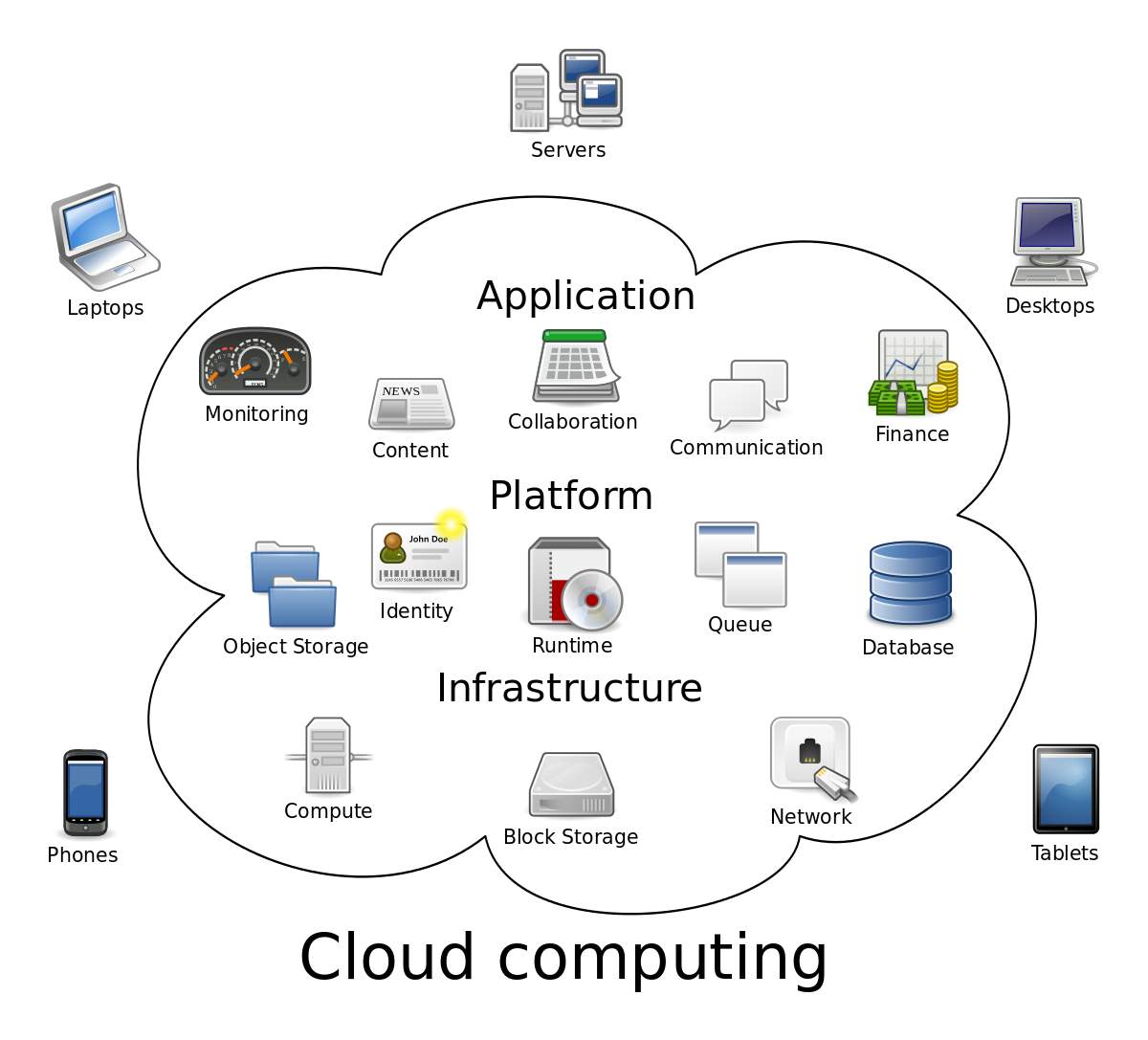
Fig 2: cloud computing elements
Image source: https://en.wikipedia.org/wiki/Cloud_computing
4.2 Cloud computing characteristics and benefits
Distributed computing brags a few alluring advantages for organizations and end clients. Five of the fundamental advantages of distributed computing are:
• Self-benefit provisioning: End clients can turn up figure assets for a workload on request. This disposes of the customary requirement for IT heads to arrangement and oversee register assets.
• Elasticity: Companies can scale up as registering needs increment and scale down again as requests diminish. This disposes of the requirement for huge interests in nearby foundation, which might possibly stay dynamic.
• Pay per utilize: Compute assets are estimated at a granular level, empowering clients to pay just for the assets and workloads they utilize.
• Workload versatility: Cloud specialist organizations regularly actualize repetitive assets to guarantee flexible capacity and to keep clients’ vital workloads running – frequently over different worldwide areas.
• Migration adaptability: Organizations can move certain workloads to or from the cloud – or to various cloud stages – as wanted or consequently for better cost investment funds or to utilize new administrations as they rise.
4.3 Cloud processing sending model
Distributed computing administrations can be private, open or half breed.
Private cloud: administrations are conveyed from a business’ server farm to inside clients. This model offers the flexibility and accommodation of the cloud, while safeguarding the administration, control and security regular to neighborhood server farms. Interior clients might possibly be charged for administrations through IT chargeback.
Open cloud: an outsider cloud specialist co-op conveys the cloud benefit over the web. Open cloud administrations are sold on request, regularly incrementally or hour, however long haul responsibilities are accessible for some administrations. Clients pay for the CPU cycles, stockpiling or transfer speed they expend.
A half breed cloud is a mix of open cloud administrations and an on-premises private cloud, with coordination and mechanization between the two. Organizations can run mission-basic workloads or delicate applications on the private cloud and utilize people in general cloud to deal with workload blasts or spikes popular.
The objective of a cross breed cloud is to make a brought together, robotized, versatile condition that exploits all that an open cloud foundation can give, while as yet keeping up control over mission-basic information.
4.4 Cloud processing administrations
In spite of the fact that distributed computing has changed after some time, it has been isolated into three expansive administration classes: framework as an administration (IaaS), stage as an administration (PaaS) and programming as an administration (SaaS).
IaaS suppliers, for example, AWS, supply a virtual server occasion and capacity, and in addition APIs that empower clients to relocate workloads to a VM. Clients have a distributed stockpiling limit and can begin, stop, get to and design the VM and capacity as wanted. IaaS suppliers offer little, medium, vast, additional expansive and memory-or process advanced examples, notwithstanding altered occurrences, for different workload needs.
In the PaaS display, cloud suppliers have advancement apparatuses on their frameworks. Clients get to these devices over the web utilizing APIs, web-based interfaces or entryway programming. PaaS is utilized for general programming improvement, and numerous PaaS suppliers have the product after it’s created. Regular PaaS suppliers incorporate Salesforce’s Force.com, AWS Elastic Beanstalk and Google App Engine.
SaaS is a dispersion display that conveys programming applications over the web; these applications are frequently called web administrations. Clients can get to SaaS applications and administrations from any area utilizing a PC or cell phone that has web get to. One normal case of a SaaS application is Microsoft Office 365 for profitability and email administrations.
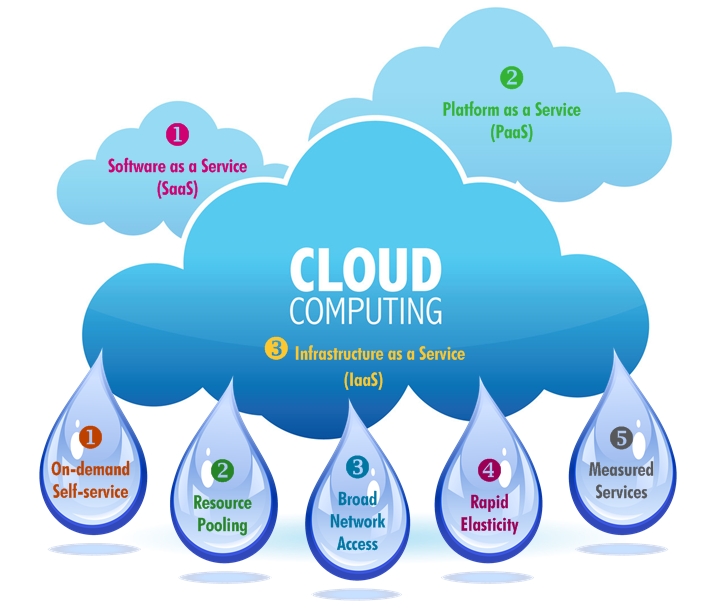
Fig 3: cloud computing services
Image source: https://www.bodhost.com/blog/the-concept-of-cloud-computing-design-principles-and-paradigms/
4.5 Cloud Computing Security
Security remains an essential worry for organizations pondering cloud reception – particularly open cloud appropriation. Open cloud specialist organizations share their fundamental equipment foundation between various clients, as open cloud is a multi-occupant condition. This condition requests bountiful confinement between sensible register assets. In the meantime, access to open distributed storage and process assets is monitored by account login accreditations.
Numerous associations bound by complex administrative commitments and administration benchmarks are as yet reluctant to put information or workloads in general society cloud because of a paranoid fear of blackouts, misfortune or burglary. Be that as it may, this protection is blurring, as legitimate segregation has demonstrated dependable, and the expansion of information encryption and different personality and access administration devices includes enhanced security inside the general population cloud.
4.5 A short history of distributed computing
Distributed computing follows its birthplaces back to the 1960s, when the PC business perceived the potential advantages of conveying figuring as an administration or an utility. In any case, early processing did not have the network and transmission capacity expected to actualize figuring as an utility. It wasn’t until the expansive accessibility of web transfer speed in the late 1990s that processing as an administration wound up down to earth.
In the late 1990s, Salesforce offered one of the main monetarily fruitful usage of big business SaaS. This was taken after nearly by the landing of AWS in 2002, offering a scope of administrations, including capacity and calculation – and now grasping databases, machine learning and different administrations. Today, Microsoft Azure, Google Cloud Platform and different suppliers have joined AWS in giving cloud-based administrations to people, private companies and worldwide ventures.
5. Strategy
5.1 Proposed Methodology
This Section portrays Sequence of endeavors and execution of system remembering the true objective to achieve alluring targets. Purpose for this undertaking is to influence a space where one to can get to the home machines remotely. The three essential building pieces of this venture are NodeMCU microcontroller, Web server and Mobile application. The basic idea is to control apparatuses and contraptions utilizing the specified segments. NodeMCU will be related with the transfers which can be worked by a reasonably minimal electric current that can turn ON and OFF electric machines. Using transfers is ensured as there is no any physical contact among NodeMCU and AC contraptions. Client can get to the machines remotely with the help of web. Such an application is to a great degree accommodating however less secure; anyone can get to it if no security is given. So to influence the application more secure we to can give mystery word protection to the Mobile application or we can make it unshareable/shareable to a foreordained number of customers as indicated by the necessities
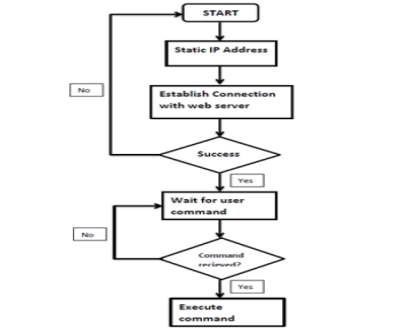
Figure 4: Block diagram of proposed system
5.2 System Architecture
This Section delineates Sequence of endeavors and execution of structure remembering the true objective to achieve alluring goals. Explanation for this errand is to influence a space where one to can get to the home machines remotely. The system has two areas, to be particular; equipment and programming. As showed by figure 5 the gear structure involves NodeMCU board, Relays, and home apparatuses. C dialect is used to plan the NodeMCU board. In this structure, the sections used are NodeMCU board, hand-off driver. These gear parts are used as a piece of demand to control the home machines. NodeMCU barricade will construct an interface between the gear and the item application. The NodeMCU Wi-Fi will help in transmitting and tolerating the information given by the customer.
Figure: 5 Proposed System Architecture
Area 1-The guideline method for the machine is controlling fundamental power utilizing versatile application. The guideline part of NodeMCU is that it goes about as an interface between equipment segment and programming (Application).
Area 2-Project will be masterminded. Aggregation of the impressive number of modules will be done. The whole system will be executed and will have the ability to run magnificently.
5.3 Hardware Components
NodeMCU: NodeMCU is an open source LUA based firmware produced for ESP8266 wifi chip. By investigating usefulness with ESP8266 chip, NodeMCU firmware accompanies ESP8266 Development board/pack i.e. NodeMCU Development board. Since NodeMCU is open source stage, their equipment configuration is open for alter/adjust/assemble. The NodeMCU is an open-source advancement pack in light of popular and cheap ESP8266 WiFi chip. It was initially intended to work with Lua programming dialect, be that as it may, as ESP8266 has it’s own library for Arduino IDE and NodeMCU has its own installed voltage controller (to spare the ESP module from voltage surges and to enable you to associate the board straightforwardly to the USB port of your PC) in addition to you don’t to hold the FLASH and RESET catches like on the conventional ESP8266. The NodeMCU ends up being a perfect for engineers who need to begin with ESP8266 WiFi module family.
NodeMCU Dev Kit/board comprises of ESP8266 wifi empowered chip. The ESP8266 is a minimal effort Wi-Fi chip created by Espressif Systems with TCP/IP convention. For more data about ESP8266, you can allude ESP8266 WiFi Module.
There is Version2 (V2) accessible for NodeMCU Dev Kit i.e. NodeMCU Development Board v1.0 (Version2), which as a rule comes in dark shaded PCB. NodeMCU Dev Kit has Arduino like Analog (i.e. A0) and Digital (D0-D8) sticks on its board.
It underpins serial correspondence conventions i.e. UART, SPI, I2C and so forth.
Utilizing such serial conventions we can associate it with serial gadgets like I2C empowered LCD show, Magnetometer HMC5883, MPU-6050 Gyro meter + Accelerometer, RTC chips, GPS modules, touch screen shows, SD cards and so on.
Figure 6 demonstrates the NodeMCU microcontroller which we will use in our model.
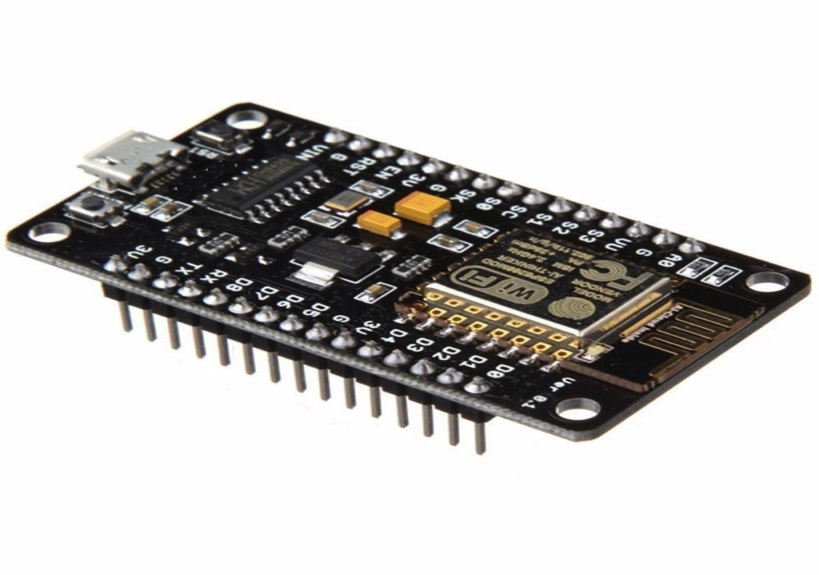
Figure: 6 NodeMCU microcontrollers
Transfers: Relays are switches that open and close circuits electromechanically or electronically. Transfers control one electrical circuit by opening and shutting contacts in another circuit. As transfer charts appear, when a hand-off contact is regularly open (NO), there is an open contact when the hand-off isn’t invigorated. At the point when a hand-off (Figure 7) contact is Normally Closed (NC), there is a shut contact when the hand-off isn’t invigorated. In either case, applying electrical current to the contacts will change their stateTransfers are for the most part used to switch littler streams in a control circuit and don’t more often than not control expending gadgets with the exception of little engines and Solenoids that draw low amps. Regardless, transfers can “control” bigger voltages and amperes by having an opening up impact on the grounds that a little voltage connected to transfers loop can bring about a huge voltage being exchanged by the contacts.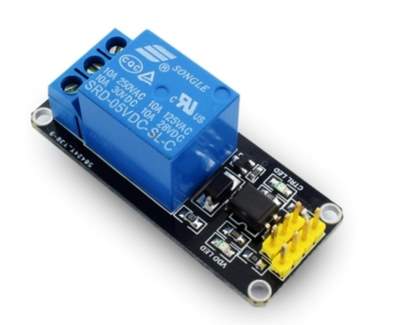
Figure: 7 Relay
Voltage Regulator 7805: The voltage regulator IC 7805 (figure 8) is actually a member of 78xx series of voltage regulator ICs. It is a fixed linear voltage regulator. The xx present in 78xx represents the value of the fixed output voltage that the particular IC provides. For 7805 IC, it is +5V DC regulated power supply. This regulator IC also adds a provision for a heat sink. The input voltage to this voltage regulator can be up to 35V, and this IC can give a constant 5V for any value of input less than or equal to 35V which is the threshold limit.
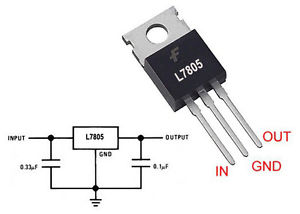
Figure: 8 LM7805
Resistor: A resistor is an electrical component that limits or regulates the flow of electrical current in an electronic circuit. Resistors (figure 9) can also be used to provide a specific voltage for an active device such as a transistor. All other factors being equal, in a direct-current (DC) circuit, the current through a resistor is inversely proportional to its resistance and directly proportional to the voltage across it. This is the well-known Ohm’s Law. In alternating-current (AC) circuits, this rule also applies as long as the resistor does not contain inductance or capacitance. Resistors can be fabricated in a variety of ways. The most common type in electronic devices and systems is the carbon-composition resistor. Fine granulated carbon (graphite) is mixed with clay and hardened. The resistance depends on the proportion of carbon to clay; the higher this ratio, the lower the resistance.
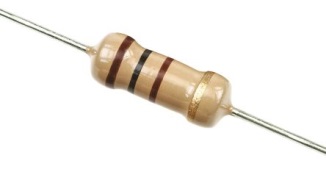
Figure: 9 Resistors
LED INDICATOR: light-emitting diode (LED) (see figure 10) is a semi-conductor device that emits visible light when an electric current passes through it. The light is not particularly bright, but in most LEDs it is monochromatic, occurring at a single wavelength. The output from an LED can range from red (at a wavelength of approximately 700 nanometers) to blue-violet (about 400 nanometers). Some LEDs emit infrared (IR) energy (830 nanometers or longer); such a device is known as an infrared-emitting diode (IRED). It will be used to indicate power in a circuit.
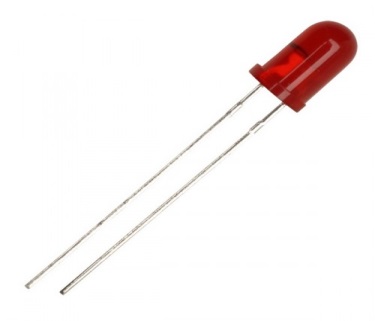
Figure: 10 LED
IC L293D: L293D is a typical Motor driver or Motor Driver IC which allows DC motor to drive on either direction. L293D (see figure 11) is a 16-pin IC which can control a set of two DC motors simultaneously in any direction. It means that you can control two DC motor with a single L293D IC. It works on the concept of H-bridge. H-bridge is a circuit which allows the voltage to be flown in either direction.
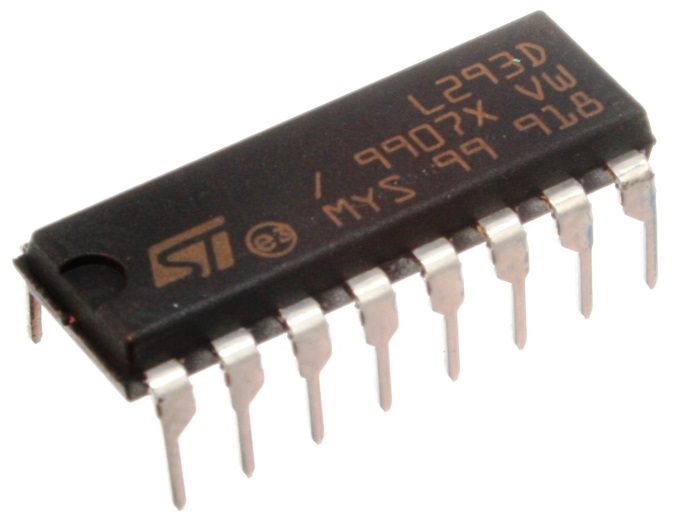
Figure: 11 IC L293D
IC BASE: The 16 pin IC base acts as a removable 16 pin IC holder that can be soldered directly to the PCB while the IC remains interchangeable. Required for sensitive ICs which are temperature sensitive and cannot be soldered to the board or at places where the IC needs to be replaced and for microcontroller based applications where the IC needs to be removed for.
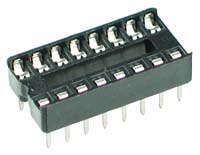
Figure: 12 IC base
Zero PCB Board: A printed circuit board (PCB) mechanically supports and electrically connects electronic components or electrical components using conductive tracks, pads and other features etched from one or more sheet layers of copper laminated onto and/or between sheet layers of a non-conductive substrate. Components are generally soldered onto the PCB to both electrically connect and mechanically fasten them to it.
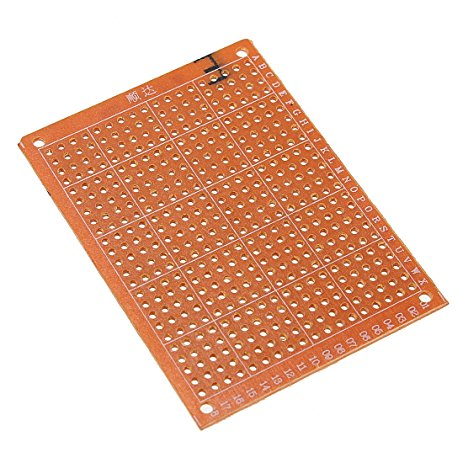
Figure: 13 Zero PCB Board
5.4 Software Requirements
Blynk App: Blynk is a Platform with iOS and Android apps to control NodeMCU, Raspberry Pi and the likes over the Internet. It’s a digital dashboard where you can build a graphic interface for your project by simply dragging and dropping widgets. It’s really simple to set everything up and you’ll start tinkering in less than 5 mints. Blynk (see figure) is not tied to some specific board or shield. Instead, it’s supporting hardware of your choice. Whether your Arduino or Raspberry Pi is linked to the Internet over Wi-Fi, Ethernet or this new ESP8266 chip, Blynk will get you online and ready for the Internet of Your Things.
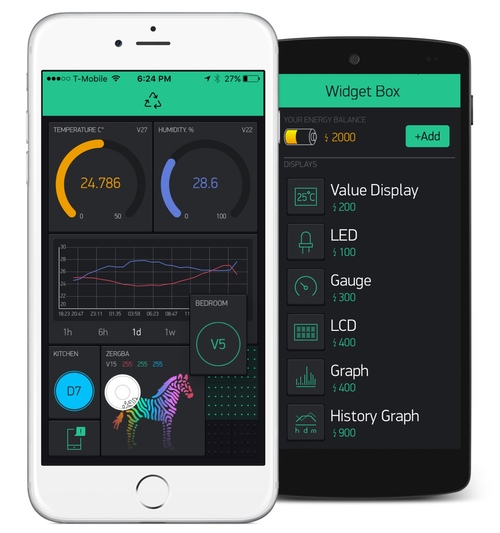
Figure: 14 Blynk app Interface
Blynk App Server: Blynk Server is an Open-Source Netty based Java server, responsible for forwarding messages between Blynk mobile application and various microcontroller boards (i.e. Arduino, NodeMCU Etc.). Blynk Cloud is software written on Java using plain TCP/IP sockets and running on our server. Blynk iOS and Android apps connect to Blynk Cloud by default. Access is free for every Blynk user. To run Blynk Server, all we need is Java Runtime Environment.
Blynk Libraries: It enables communication, for all the popular hardware platforms, with the server and processes all the incoming and out-coming commands.
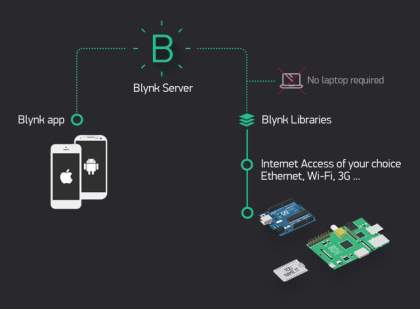
Figure: 15 Blynk cloud Architecture
Arduino Software: Arduino is an open-source platform used for building electronics projects. Arduino consists of both a physical programmable circuit board (often referred to as a microcontroller) and a piece of software, or IDE (Integrated Development Environment) that runs on your computer (see figure 16), used to write and upload computer code to the physical board.
The Arduino platform has become quite popular with people just starting out with electronics, and for good reason. Unlike most previous programmable circuit boards, the Arduino does not need a separate piece of hardware (called a programmer) in order to load new code onto the board – you can simply use a USB cable. Additionally, the Arduino IDE uses a simplified version of C++, making it easier to learn to program. Finally, Arduino provides a standard form factor that breaks out the functions of the micro-controller into a more accessible package.
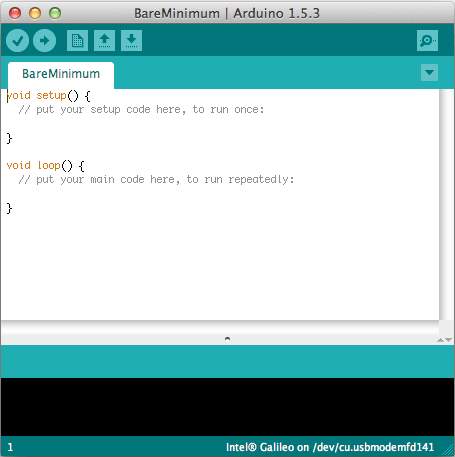
Figure: 16 Arduino software Interface
6 Limitations
6.1 Limitations of Smart Homes
1. Establishment: Depending on the many-sided quality of the framework, introducing a home computerization gadget can be a huge weight on the property holder. It can either cost you cash in the event that you enlist an outside contractual worker or cost you time in the event that you dare to do it without anyone else’s help.
2. Complex Technology: Automating everything in life may sound amazingly engaging, however now and again a decent out-dated flip of the switch is a considerable measure simpler than going after your advanced cell to turn lights on and off. Before you choose which framework is ideal for you, consider how far you truly need to bring home mechanization in your family unit.
3. Framework Compatibility: Controlling all parts of home robotization from one incorporated stage is essential, however not all frameworks are perfect with each other. Your security framework, for instance, may expect you to sign in to one area to oversee settings, while your brilliant indoor regulator may expect you to sign in to another stage to turn the aeration and cooling system on and off. To genuinely use the comfort of home robotization, you may need to put resources into concentrated stage innovation to control all frameworks and gadgets from one area.
4. Cost: Even however the cost of home mechanization frameworks has turned out to be significantly more reasonable as of late, the cost to buy and introduce a gadget can in any case include. Customer Reports offers an extensive variety of data and bits of knowledge – including costs – on the best home mechanization frameworks available.
5. Unwavering quality: A savvy home will be to a great degree dependent on your web association. On the off chance that your association drops you’ll be left with a great deal of savvy items that won’t work. Furthermore, remote signs can be hindered by different gadgets in your home and make a portion of your shrewd items work gradually or not in any way.
You have to be 100% sure of the quality of your product to give a money-back guarantee. This describes us perfectly. Make sure that this guarantee is totally transparent.
Read moreEach paper is composed from scratch, according to your instructions. It is then checked by our plagiarism-detection software. There is no gap where plagiarism could squeeze in.
Read moreThanks to our free revisions, there is no way for you to be unsatisfied. We will work on your paper until you are completely happy with the result.
Read moreYour email is safe, as we store it according to international data protection rules. Your bank details are secure, as we use only reliable payment systems.
Read moreBy sending us your money, you buy the service we provide. Check out our terms and conditions if you prefer business talks to be laid out in official language.
Read more